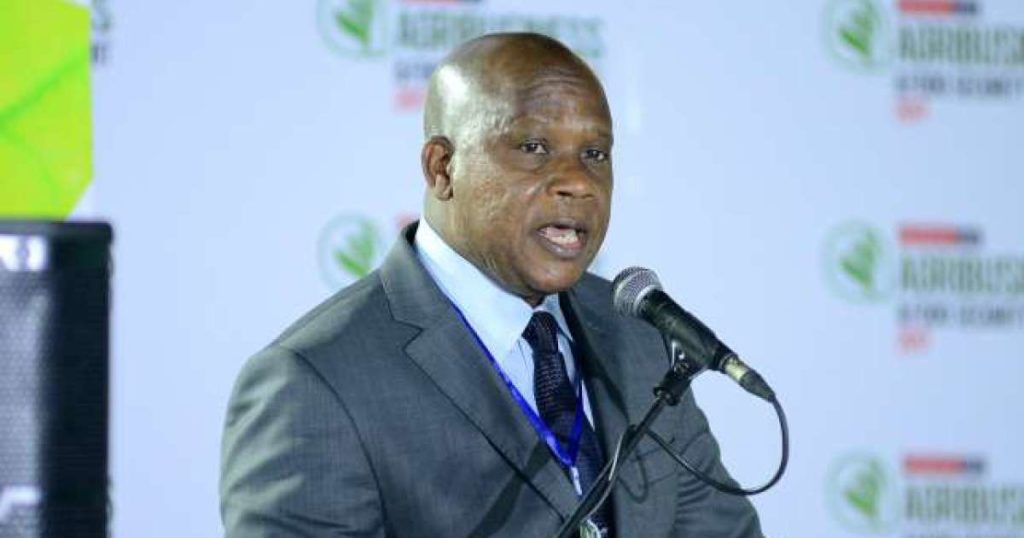The Nigeria Incentive-Based Risk Sharing System for Agricultural Lending (NIRSAL) has signed a Memorandum of Understanding (MoU) with the Nigerian Meteorological Agency (NiMet) to stem risks in agriculture and to boost production.

This is contained in a statement by the NIRSAL Head of Corporate Communications, Anne Ihugba, on Sunday, March 1, 2020 in Abuja.
Speaking at the signing of the MoU, the Managing Director of NIRSAL, Aliyu Abdulhameed, was quoted as saying it was a significant step towards achieving precision agriculture in Nigeria.
He added that it marked the beginning of a strategic partnership with NiMet, which had the official mandate to provide climate and weather data services to Nigeria.
“NIRSAL envisions that this partnership will lead to the generation and provision of agro-meteorological weather information and other strategic services for supporting finance and investment decisions.
“This opens the door to the future of primary agricultural production and utilisation of meteorological data amongst other big data sets in support of increasing yield and productivity of farmers and avoidance of catastrophic weather risk events.
“Under this partnership, NIRSAL will pursue strategies to downscale the Seasonal Rainfall Prediction (SRP) components like temperature, onset of rainfall and dry spells, cessation of rainfall to farmers.
“It will be an awareness campaign that will guide farmers against Pre-Onset Rainfall (false-onset).
“This partnership will go further to pursuing the development of crop-specific calendars for NIRSAL’s focus commodities to provide precise information on planting, maintenance and harvesting within the ACEAs, leveraging NiMet data,” he said.
The managing director further pointed out that NIRSAL would leverage on the partnership to recommend risk measures in places that experience severe dry spells, like Bauchi, Zamfara, Katsina, Kebbi, Borno and Yobe.
He stressed that NIRSAL would use platforms like town hall meetings, radio jingles and other channels of mass communication to ensure dissemination of right information to farmers.
This, according to him, would help support activities in the upstream or farming segment of crop value chains.
Abdulhameed explained that besides the partnership with MiMet, NIRSAL had been working assiduously to structure agricultural primary production in Nigeria.
He said the formation of Agro GeoCoops as one of such efforts was based on Agro Commodity Ecological Areas (ACEA) that have been identified by NIRSAL and validated by research institutes.
According to him, Agro GeoCoops, which had commenced in earnest, was a platform that presented an organised setting for finance, market and risk management.
“With 16,000 Agro GeoCoops, 4 million hectares and 8 million farmers, we believe that sufficient logic is provided for NiMet to align its strategy for siting weather stations in those commodity ecological areas.
“This heavy lifting, which is being finalised by NIRSAL, is also a foundation for the cascading of bespoke decision support services to farmers.”
He further stressed that NIRSAL with its rich experience and presence, its tentacles reached across major agricultural zones commodity growing areas.
The NIRSAL boss noted that meteorological services had always been available, but that the structure required to make the most of them in the sector had been absent.
He assured that vital weather information that got to NIRSAL from NiMet would reach “the last inch of the last mile.”
NIRSAL is a $500 million Non-Bank Financial institution.
It is wholly owned corporation of the Central Bank of Nigeria (CBN) designed to Redefine, Dimension, Measure, Re-Price and Share agribusiness-related credit risk.
In his remarks, the Director-General, NiMet, Prof. Sani Abubakar Mashi, said the partnership would enhance agricultural operations through provision of agrometeorological information in Nigeria.
He said the agency was committed to providing timely, accurate and reliable weather and climate information to guide policy and decision making.
He stressed that MiMet was committed to providing weather and climate advisories to stakeholders across all sectors including agriculture
“Considerable changes have taken place in the composition of atmospheric gases due to natural processes and human activities, such as increasing energy consumption, industrialisation, intensive agricultural practices, urban and rural development among others.
“This has led to rise in global temperature and high spatial and temporal variability.
“The changes in our climate have become more obvious in recent times following the observed anomalies in occurrence of extreme weather and climate events, which have become more frequent and result into hazards such as flooding, droughts, heat waves and increasing temperatures.
“The devastation accompanying such extreme weather events has mainly impacted on Agriculture, water resources, environment among other sectors.
“This has raised concerns in the heart of many because any threat to agriculture and environment is a threat to food and nutrition security and life in general,” he said.
Mashi further pointed out that projected impact of climate change on agricultural yields between 2003 and the 2080s reveals that Nigeria lies between -5 and -15 per cent expected production level.
According to him, this means a reduction in agricultural yields, hence the projection calls for total concern.
“Changes have also been observed in rainfall distribution patterns in Nigeria from 1951-2012 as shown in the rainfall anomaly chart with corresponding periods of occurrence of extreme rainfall events droughts and floods.”
He expressed concern that agriculture-based livelihood systems that were already vulnerable to food insecurity in Nigeria would face risk of increased crop failure, especially over vulnerable regions in the country.
He said, the partnership with NIRSAL was a perfect fit for. NiMet achieving its primary mandate of promoting climate-smart agriculture in agricultural activities.
He assured that NiMet would provide all necessary support to NIRSAL to reach as many farmers possible by designing and developing effective strategies for disseminating agrometeorological services to farmers leveraging on the latest technology.
He further promised that NiMet would be developing site for specific cropping calendars in line with focus on agricultural value chain across the country.
